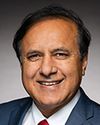Thank you very much, Madam Chair.
I think at issue here is the question around the OIC coming-into-force date. If you look at the documents that were sent to committee members—and a member asked me to table these documents—you'll see these documents were sent to the clerk. I received a copy as well, separate and apart from that, so committee members, if they have not received them from the clerk already, will, I assume, at some point in time be getting these documents.
Upon receipt of these documents—and let me say there were a lot of documents—I began to look through the information, aside from having to read what was available in the public realm through the media. To that point, I also requested that we have this meeting, because I think it's important for us to get clarity on the issue and to try to shed some light on the situation.
The heart of the issue is the date the OIC came into force, and the copy of the OIC that the government issued. There were supplementary documents to indicate that. The act came into force and was registered on November 20, and the OIC said that this was the date on which the act would come into force. That's very explicit in the language.
Now, I'm not a lawyer. I'm also not a cabinet minister at this level, but having been a cabinet minister at a different level, I can tell you that when OICs come about, they're very intentional. They're not just made-up words. Officials are not loosey-goosey about them. They're very intentional. This may be just a human error, and I know the officials are saying it's just a human error, but I think we need to delve into that a bit and be certain that it was in fact a human error.
The OIC explicitly says that November 20 is the day the act would be registered and would come into force, so that language to me is not confusing. That language is very clear in terms of what it is.
Why is it the case that this language differs from that in other OICs? As stated in one of the ATIP documents, one of the officials indicated that there was unusual language being used. To me, that begs the question: Why was unusual language used for this OIC? What's the rationale for that? Maybe there's a really legitimate reason for that. I just don't know at this point in time. Therefore, I would like to get clarity from the officials on why this particular OIC is different from other OICs, and would like them to explain the discrepancy between the clarity of the OIC itself and the change in date to December 9.
From that perspective, I think it is important, given the significance of the issue, to get clarity on it. It might just be an honest mistake. If it is, it's not my intention to chastise anyone. It's just so we can clear the air. The last thing I would want is for the minister or the government to be under that cloud. I don't think that's good for anyone. It's not good for democracy, so let's clear it up once and for all.
With respect to the number of meetings, do we need three meetings? Do we need one meeting? To be honest with you, I'm not sure. Maybe it's just one meeting. Maybe the light will be shone and we'll all see it very clearly, but I think we should have a meeting and at the very minimum find out what the lay of the land is. I'd like to have those questions answered, and then we can make a determination as to whether or not additional meetings are required.
This motion calls for three meetings, but we should have at least one meeting, find out what the lay of the land is and then make a determination on how best to proceed. I think as elected officials we should do our due diligence on this. I know we received a letter from the deputy telling us that this was a human error, so let's get the information to clarify that so we can be certain, as officials around this table, that we are addressing this issue.
That's what I would like to propose, Madam Chair, and I hope that answers the questions of committee members.
Finally, I want to address the questions around concurrent meetings and so on. We are doing concurrent meetings, by the way, at committee. It's a bit confusing, truth be told. We're doing a report on a different study, and we're continuing work on another study. There is, of course, the Roxham Road issue as well, which is very important and very serious. I absolutely want to get to that. At our last meeting I moved a motion, which was supported by this committee, on the Afghan file. Some people's lives hang in the balance, so that too is very important.
It is not my intention to delay anything. We have a lot of work to do and we need to get to it, but to clear the air on this, we should at least have one meeting and find some clarity on where it lies. If it's honestly a human mistake, then so be it and we can move on, but we should actually have that clarity.






